-

新人教版高中英语必修3Unit 1 Festivals and Celebrations-Listening &Speaking&Talking教学设计
The theme of this section is “Talk about festival activities and festival experiences”.Festival and holiday is a relaxing and interesting topic for students. This part talks about the topic from the daily life of students’. In the part A ---Listening and Speaking, there are three conversations among different speakers from three countries(Japan, Rio and China), where the speakers are participating in or going to participate in the festivals and celebrations. So listening for the relationship among them is a fundamental task. Actually, with the globalization and more international communication, it is normal for Chinese or foreigners to witness different festivals and celebrations in or out of China. In the Conversation 1, a foreign reporter is interviewing a Japanese young girl who just had participated in the ceremony of the Coming-of-Age Day on the street and asking her feeling about the ceremony and the afterwards activities. Conversation 2, Chinese girl Li Mei is witnessing the Rio Carnival for the first time, and her friend Carla gives her some advice on the costumes which enables her to match with the carnival to have a good time. Conversation 3, a Chinese guide is showing a group of foreign visitors around the Lantern Festival and introducing the customs of the festival to them. The three conversations have a strong vitality and insert the festival and cultural elements from different countries. So perceiving the festivals and cultures from different countries is the second task. At the same time, the scripts also insert the targeted grammar --- v-ing as attributive and predicative, which students can perceive and experience in a real context and make a road for the further study. That is the third task. In the Part B--- Listening and Talking, the theme is “Talk about festival experience”, which is the common topic in our daily conversations. During the conversation, Song Lin, a Chinese student, asked Canadian friend Max about how to spend Christmas. In the conversation, Song Lin talked about experience and the feelings during the Chinese Spring Festival, during which there are not only some enjoyable things but some unpleasant things. After the listening, perhaps students find there are some similarities between Christmas and the Chinese Spring Festival as there are some differences in the origins and celebrations. For example, people always visit friends and relatives, decorate their houses, have a big dinner together, chat and give presents to each other.

新人教版高中英语必修3Unit 1 Festivals and Celebrations-Reading for writing教学设计二
Step 3 Analyzing article structureActivity 31. Teachers raise questions to guide students to analyze the chapter structure of this diary and think about how to describe the festival experience. (1)What should be included in the opening/body/closing paragraph(s)?(2)How did the writer arrange his/her ideas?(3)What kind of interesting details did the writer describe?(4)How did the writer describe his/her feelings/emotions during the event?2. Students read and compare the three sentence patterns in activity 2. Try to rewrite the first paragraph of the diary with these three sentence patterns. After that, students exchange corrections with their partners. Such as:●This was my first time spending three days experiencing the Naadam Festival in China’s Inner Mongolia Autonomous Region and it was an enjoyable and exciting experience. ●I'll never forget my experience at the Naadam Festival because it was my first time to watch the exciting Mongolian games of horse racing, wrestling, and archery so closely. ●I'll always remember my first experience at the Naadam Festival in China’s Inner Mongolia Autonomous Region because it was so amazing to spend three days witnessing a grand Mongolian ceremony. Step 4 Accumulation of statementsActivity 41. Ask the students to read the diary again. Look for sentences that express feelings and emotions, especially those with the -ing form and the past participle. Such as:● …horse racing, wrestling, and archery, which are all so exciting to watch. ● some amazing performances● I was surprised to see…● I was a little worried about. . . ● feeling really tiredOther emotional statements:●I absolutely enjoyed the archery, too, but the horse races were my favourite part. ●I'm finally back home now, feeling really tired, but celebrating Naadam with my friend was totally worth it. ●He invited me back for the winter to stay in a traditional Mongolian tent and cat hot pot. I can’t wait!2. In addition to the use of the -ing form and the past participle, the teacher should guide the students in the appreciation of these statements, ask them to memorize them, and encourage them to use them reasonably in writing practice.

新人教版高中英语必修3Unit 1 Festivals and Celebrations-Reading for Writing教学设计一
The topic of this part is “Write about your festival experience”.During the Listening and Speaking and Talking, students are just asked to say out their festival experiences such as the Spring Festival, Mid-autumn Day, but this part students will be asked to write down their own festival experiences. During the reading part, it introduces the Naadam Festival in Inner Mongolia Autonomous Region, which can give students a good example to imitate. Students not only learn the festival, but touch and feel the Inner Mongolian’s character, the spirit and cultural atmosphere, which can help students form the cultural awareness and learn to enjoy and value the diversity of Chinese culture.Concretely, the dairy tells the experience that the author spent the Naadam Festival in Inner Mongolia Autonomous Region with his/her friend. The structure is clear. In the opening paragraph, it introduces the topic of the Naadam Festival and the whole feeling. Then it introduces the items of the festival like the ceremony, wrestling and horse racing. Finally, it summarizes this experience. Because this part is a travel journal, we must guide students pay more attention to these details: 1. use the first person. 2. use the past tense to tell the past thing and use the present or future tense to describe the scenery. 3. use the timeline to tell the development. 4. be careful for the author’s psychology, emotion and feeling, etc.1. Read quickly to get main idea; read carefully to get the detailed information about Naadam Festival.2. Learn the structure of the reading article and language.3. Write an article about a festival experience4. Learn to use the psychology, emotions and feeling in the writing.1. Write an article about a festival experience.2. Use the structure of the reading article and language.
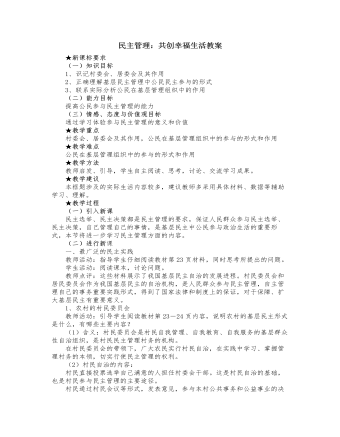
人教版高中政治必修2民主管理:共创幸福生活教案
教师活动:请同学们阅读教材P26页图表,思考所提的问题。学生活动:阅读课本,积极思考。教师点评:公民应在本地事务中增强主人翁责任感,积极参与民主管理。在参与民主管理的过程中,学习民主管理的知识和技能,体验民主管理的意义和价值,逐步增强和提高自己政治参与的责任意识和实际本领。2、青年学生应积极参与民主管理青年学生应着眼于未来发展,积极参与民主管理。在基层民主自治这种最广泛的民主实践中,获得更多民主管理机会,以不同方式尝试参与参与民主管理活动。在参与民主管理的过程中,学习民主管理的知识和技能,体验民主管理的意义和价值,逐步增强和提高自己政治参与的责任意识和实际本领。(三)课堂总结、点评本节内容讲述了我国的基层民主管理形式和主要内容,明确了积极参与基层民主管理的重要意义,这对我们提高自身政治素质,增强参与政治生活的责任感和能力等,有重大作用。
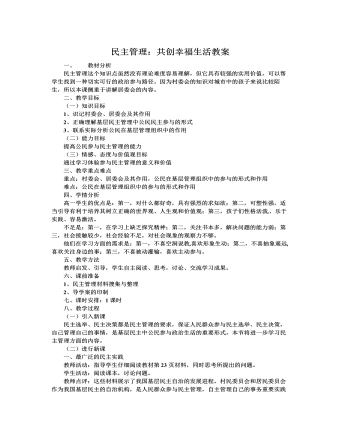
人教版高中政治必修2民主管理:共创幸福生活教案
一、 教材分析民主管理这个知识点虽然没有理论难度容易理解,但它具有较强的实用价值,可以帮学生找到一种切实可行的政治参与路径。因为村委会的知识对城市中的孩子来说比较陌生,所以本课侧重于讲解居委会的内容。二、教学目标(一)知识目标1、识记村委会、居委会及其作用2、正确理解基层民主管理中公民民主参与的形式3、联系实际分析公民在基层管理组织中的作用(二)能力目标提高公民参与民主管理的能力(三)情感、态度与价值观目标通过学习体验参与民主管理的意义和价值三、教学重点难点重点:村委会、居委会及其作用,公民在基层管理组织中的参与的形式和作用难点:公民在基层管理组织中的参与的形式和作用四、学情分析高一学生的优点是:第一,对什么都好奇,具有强烈的求知欲;第二,可塑性强,适当引导有利于培养其树立正确的世界观、人生观和价值观;第三,孩子们性格活泼,、乐于实践、容易激活。
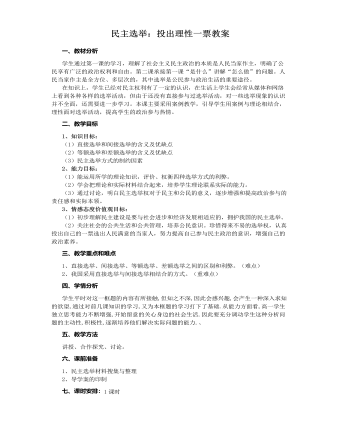
人教版高中政治必修2民主选举:投出理性一票教案
1、第一,材料一和材料二的选举方式有什么异同?(1)相同点:①都采用了演讲和答辩等形式,都带有竞选的性质;②都采用无记名、直接选举的方式进行投票选举;③都属于差额选举。(2)不同点:①材料一是对村主任进行的正式选举,结果是直接产生村主任,材料二是对镇长候选人进行的选举,结果只是确定镇长候选人,镇长人选还有待进行正式选举;②材料一是全体村民都参加选举,材料二是各户派代表参加选举;③材料二比材料一更强调竞选的方式。第二,你还知道哪些选举方式?除了直接选举外,还有间接选举、等额选举、差额选举等。第三,你能对这几种选举方式的意义和效果,作出自己的评估吗?这是学习中要探究的问题,这里不一定能回答出来,等到学完本框内容后,可以得出比较明确的答案。第四,材料三给了你什么启示?这个问题不要求统一的答案,能讲出一两点即可。提示如下:(1)新中国成立后,选举制度经历半个多世纪的发展,正在逐步走向完善;

人教版高中地理必修2如何看待农民工现象精品教案
尽管如此,农民工作为一个新的社会阶层,其独特的经济需求和政治诉求应该得到充分的尊重。虽然农民工的“根”还在农村,但是他们已经脱胎换骨,日益成长为一个迫切需要社会认可的新兴阶层。3.农民工处于何种生存境况?作为“廉价劳动力”,工资水平低,拖欠时有发生。作为“超时劳动力”,工作时间极长,超负荷从事繁重工作。作为“高危劳动力”,社会保障缺失,各种安全事故频繁。4.农民工问题有多么重要?农民工问题关系到农业增效、农民增收和农村繁荣。农民工问题关系到工业化、城镇化和“以工补农、以城促乡”。农民工问题关系到社会主义和谐社会建设。5.解决农民工问题应该做些什么?构建城乡一体化就业体系。健全农民工权益保障制度。强化农民工输出地和输入地培训。稳妥解决农民工户籍问题。改进对农民工的管理和服务。
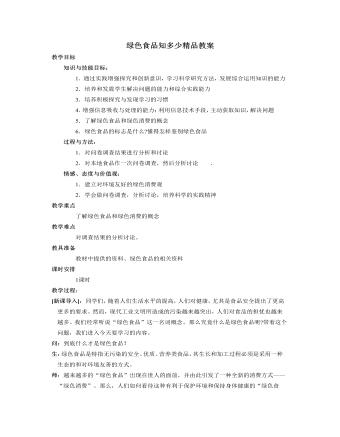
人教版高中地理必修2绿色食品知多少精品教案
生1:加强对绿色食品的宣传和扶持力度。当前的形势迫切要求我们发展绿色食品,因为绿色食品是真正实现可持续发展的,做到了发展经济和环境保护相结合,而且有利于增进人民身体健康。但目前绿色食品在市场上难成气候,主要是宣传和扶持不够。生2:绿色食品对环境、生长过程、加工过程以及运输等过程都有很严格的要求,很多环境相对优良的地区都是边远落后地区,必须给予政策上的扶持和优惠,才能降低成本,市场发展前景才会更加广阔。活动与探究对当地绿色食品市场情况作调查并初步分析。活动的实施过程:1.确定调查研究的目标并制定调查研究的计划。市场调查要深入广大消费者,可以去市场上做调查,‘对象包括消费者和经营者。形式可以是问卷,也可以是现场采访。弄清楚被调查者对绿色食品的态度,是否了解食用绿色食品的意义,是否懂得鉴别绿色食品等。对象力求涉及各个年龄段,多种职业。2.对问卷调查进行整理、分析,得出结论。
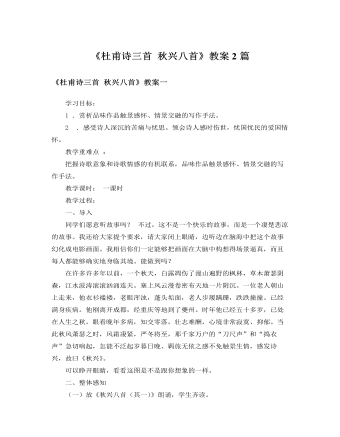
人教版高中语文必修3《杜甫诗三首 秋兴八首》教案2篇
4、主旨 哪一联明确地点明全诗题旨?表达了作者的什么感情?试做分析 颈联。 菊花开在秋天,所以这 “ 丛菊 ” 回应了诗题中那个 “ 秋 ” 字。 “ 他日 ” 可以指过去也可以指未来,在这里是指过去。“丛菊两开”,指诗人于 765 年离开成都,原打算很快出峡,但这年留居云安,次年又留居夔州,见到丛菊开了两次,还未出峡,故对菊掉泪。秋菊两度盛开,使诗人再次洒下往日流过的眼泪。“开”字双关,一谓菊花开,又言泪眼随之开。此时他仍然滞留在他乡,他始终没有放弃回乡的打算。孤舟可以系住,使其不能泛诸中流,但诗人的心是系不住的。他的心早已越过江河,越过关山,飞到了长安。所以,一叶靠岸系绳的孤舟,始终都牵动着诗人的故园之思。这一联是全篇诗意所在。孤舟本来只能系住自己的行踪,却把诗人的思乡之心也牢牢地系住了,故见舟伤心,引出故园之思,表现出思乡之情的深沉浓烈和欲归不得的无奈与凄伤,为文章的主旨句。
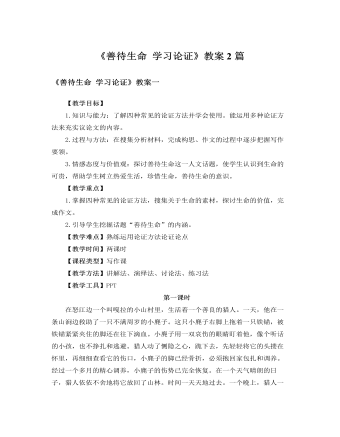
人教版高中语文必修3《善待生命 学习论证》教案2篇
论证方法之引证法如何用好引证法:1.所引用的名言警句等针对性要强。每句名言都产生于特定的背景,都应用于特定的交际目的,即使谈同一个问题,也有不少名言可供选取。2.要简洁,不宜过多。议论是在发表自己的见解而不是在介绍他人的见解。引用他人的话,目的是为了让读者更加信服自己的话。3.要注意直接引用和间接引用的区别。直接引用务求文字、甚至标点均准确无误;间接引用只须述其大意,但要注意人称的转换。论证方法之喻证法喻证法是用设喻来论证论点的方法。在议论文中,设喻可以使论点更易懂、更风趣、更容易获得读者的认同。喻证法能化抽象为具体、化艰深为浅显、化枯燥为生动。论证方法之喻证法如何用好喻证法:1.以小见大,就近取譬。要精选生活中细小的、人们熟悉的事物做为设喻的喻体。2.喻体不求形似,只求神似。做为喻证的喻体与做为比喻的喻体不同。比喻的喻体是为了强调特征,描绘事物,侧重形似,以形比形;而喻证的喻体是为了阐发观点,以正视听,力求神似,以义取形。
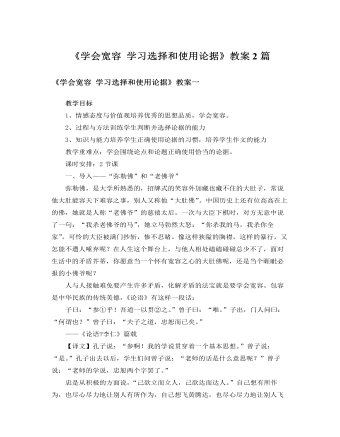
人教版高中语文必修3《学会宽容 学习选择和使用论据》教案2篇
评价分析法,就是引述事例后,对所引述的事例作适当的评价,从而使自己的观点得到印证。例如,在论“节俭”时,引用了“曾国藩以俭戒子,其子曾纪泽终成出色的外交家;方志敏居官不贪,一生清贫,千古留名”的事实后,接着进行分析:是的,“俭者心常富”,节俭能培养人同困难作斗争的勇气和意志,而这正是一个人立业最重要的素质。从这个意义上说,有人说饥饿是人生的佐料,吃苦是一种资本也不无道理,而自觉和戒奢尚俭则更是促人修身养性,磨炼意志的有效途径。这里,作者紧扣论点,对论据进行了评价性分析,这种评价分析使作者的观点得到强化。(四)因果分析法因果分析法,就是抓住论据所述的事实,并据此推求形成原因的一种分析方法。事出必有其因。我们可以依据事物发展变化的因果关系,由事物发展变化的结果,推导出产生这种结果的原因,从而揭示出一定的生活规律,使事例有力地证明观点。
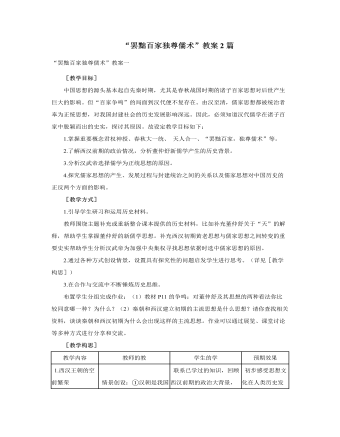
人教版高中历史必修3“罢黜百家独尊儒术”教案2篇
战国阴阳五行家邹衍认为,历史中的朝代更替是由于五德运行产生的影响。按照邹衍的学说,每个朝代必须与五德之一相连,因此,这个朝代就应当遵循这五德之一的要求来运转。董仲舒修改了这个理论,认为朝代的更替不是依循五德运行的顺序,而是依循“三统”,即黑统、白统、赤统的顺序。他在《三代改制质文》中说:每个朝代都依循一统,每统又各有其为政的系统。按董仲舒的说法,夏朝代表黑统,商朝代表白统;周朝则是赤统。夏、商、周三朝完成了这一历史循环。之后,历史又开始一次新的循环,新的朝代又应当代表黑统。继承周朝统治的既不是秦朝,也不是汉朝,而是孔子,他承受天命,创立了黑统。孔子所受天命,不是一种“法统”,而是一种“道统”。董仲舒说:“《春秋》大一统者,天地之常经,古今之通谊也。今师异道,人异论,百家殊方,指意不同,是以上亡以持一统;法制数变,下不知所守。臣愚以为诸不在六艺之科孔子之术者,皆绝其道,勿使并进。邪辟之说灭息,然后统纪可一而法度可明,民知所从矣。”
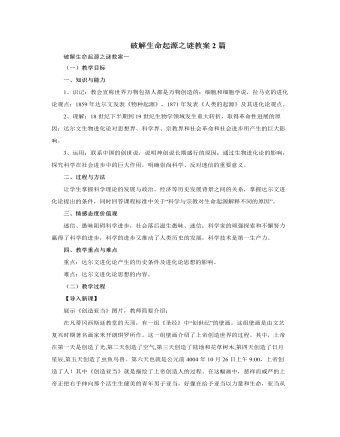
人教版高中历史必修3破解生命起源之谜教案2篇
设问:你怎么看待这个问题的?(这是达尔文没有想到的,是有人利用了达尔文的学说,科学应该与其区分开来,但是科学家在研究时,既要做到为追求真理不断探索,又要有一定的人文精神,比如我们只有以人为本,才能找到解决当今社会面临的诸如环保、战争、饥荒等问题的途径,才能构建防止核物理技术、克隆技术、信息技术、生物技术、太空技术等可能对人类造成不可逆转的破坏作用的思想基础、决策机制和社会条件。更重要的是社会和国家应该对此有足够的认识,正因为此,所以现在当一项科学发明出台后,就会有一些法律出台,限制其可能的非人道用途。但是这些影响应不成为我们进行科学探究的阻碍。)(3)科学与宗教的斗争设计意图:再次引导学生认识,科学的探索永无止境,同时也再次认识宗教和科学理论产生的原因。材料1:1972年,美国加利福尼亚教育部竟明文规定,中学生物学课本除进化论外,必须还有神创论的内容,而且两者的页数要各占一半。

新人教版高中英语必修3Unit 2 Morals and Virtues-Discovering Useful Structure教学设计
1. 表示时间。Hearing these stories, I’m skeptical about the place. = When I heard these stories. . . 2. 表示原因。Not knowing his address, I can’t send this book to him. = Because/Since/As I don’t know his address. . . 3. 表示结果。His father died, leaving him a lot of money. =. . . and left him a lot of money4. 表示条件。Going straight down the road, you will find the department store. = If you go straight down the road. . . 5. 表示让步。Being tired, they went on working. =Although they were tired. . . 6. 表示行为方式、伴随情况或补充说明。He lay on the grass, staring at the sky for a long time. =. . . and stared at the sky for a long time注意:非谓语动词作状语时, 如所提供的动词不能和句子中的主语保持一致, 动词-ing形式必须有自己的逻辑主语, 通常由名词或代词来担任, 这就是独立主格结构。The last bus having gone, we had to walk home. (having gone的逻辑主语是the last bus, 而不是we)Weather permitting, the football match will be played on Friday. (permitting的逻辑主语是time, 而不是the football match)Step 7 Practice1. ________(study) hard, you are sure to get first prize. 2. People use plastic in their daily life, _______(leave) large amounts of waste. 3. ________(work) hard at your lessons, you are to succeed. 4. The old man, ____________(work) abroad for twenty years, is on the way back to his motherland. 5. ______________(finish) his homework, he was playing on the playground. Answers: 1. Studying 2. leaving 3. Working 4.having worked 5. Having finishedStep 8 HomeworkFinish the homework on Page 22.

新人教版高中英语必修3Unit 2 Morals and Virtues-Listening &Speaking&Talking教学设计
Example:One day, a poor boy who was trying to pay his way through school by sending newspapers door to door found that he only had one dime(一角)left. He was so hungry that he decided to beg for a meal at the next house.However, he lost his nerve when a lovely young woman opened the door. Instead of a meal he asked for a drink of water. She thought he looked hungry so she brought him a large glass of milk. He drank it slowly, and then asked, “How much do I owe you?” “You don’t owe me anything,” she replied, “Mother has taught me never to accept pay for a kindness.” “Then I thank you from the bottom of my heart.” With these words, Howard Kelly left that house.Years later the woman became badly ill and was finally sent to the hospital in a big city. Dr. Howard Kelly, now famous, was called in. When he heard the name of the town she came from, a strange light filled his eyes. Dressed in his doctor’s clothes, Dr. Kelly went into her room and recognized her at once. From that day on, he gave special attention to her, and decided to do his best to save her life.At last the woman was saved. Dr. Kelly asked the business office to pass the final bill to him. He looked at it and then wrote something on the side. The bill was sent to the woman’s room. She was afraid to open it because she was sure that it would take the rest of her life to pay for it off. Finally she looked, and the note on the side of the bill caught her attention. She read these words: “Paid in full with a glass of milk, Dr. Howard Kelly.” Tear of joy flooded her eyes.

新人教版高中英语必修3Unit 2 Morals and Virtues-Reading and Thinking教学设计
The topic of this part is “Learn to make choices in life”.The Listening & Speaking & Talking part aims at the moral dilemmas, and this part is about making choices in life. The heroin is Lin Qiaozhi, a famous medical scientist, made a great contribution to our country’s medical care. Most importantly, her life experience can inspire our students whether in studying or the development of career. she had moral dilemmas and life choices, which are similar to the students who will step into society. Besides, Lin has quite good virtues like kindness, self-improvement, insistence, job-loving , generosity and responsibility, which is worth being learned.Concretely, this article is a biography about Lin Qiaozhi. The article tells her whole life according the timeline, among which the life choices is emphasized. For example, whether married or chased her dream, returned home or stayed abroad, family or public, her choices all reflected her faith, spirit, responsibility and devotion.1. Fast reading to get the detailed information about Lin Qiaozhi; careful reading to do the deductive information.2. Learn the reading skills--deductive judgement according the context.3. Study the structure features and language features. 4. Communicate about Lin’s life choices and reflect their own life choices.1. Learn the reading skills--deductive judgement according the context.2. Study the structure features and language features.3. Communicate about Lin’s life choices and reflect their own life choices.Step 1 Lead in---Small talkWhat are some important life choices?Importance choices: university study, jobs and marriage partners. Because they can determine our future.

新人教版高中英语必修3Unit 2 Morals and Virtues-Reading for Writing教学设计
1. 这个寓言是一个关于一位国王古寓言。 The fable is an old fable about a king.2.作者用这个故事让读者对于社区的问题负有个人责任的必要印象深刻。The author used the story to impress upon readers with the need to take personal responsibility for problems in the community.3. 这个故事十分成功的实现了它的目的。The story was quite successful in achieving its purpose.Step 7 WritingPlease write a review of the story according the outline above.The fable is an old fable about a king who thought his people are lazy, so he put a large stone in the middle of the road and hides and waited to see if anyone will try to move it.The author used this story to impress upon readers with the need to take personal responsibility for problems in the community. The story was quite successful in achieving its purpose, and I liked it because it had a clear moral.However, while the moral of the story is clear, the actions of the king seemed pointless to me, because none of the characters in the story learnt anything. For this reason, I think there are better stories that can be used to impress upon people with the need for personal responsibility.Step 8 Pair workExchange drafts with a partner. Use this checklist to help your partner revise his/her draft.1. Does the writer give a short description of the story ?2. Does the description include the most important details of the story ?3. Does the writer give his or her opinion about the character or their actions ?4. Is the review well-organised ? 5. Does the writer use the -ing form as the adverbial correctly in the writing ?6. Are there any grammar, spelling, or punctuation errors ?Step 9 HomeworkPut up your revised draft in the classroom or read it to your class.
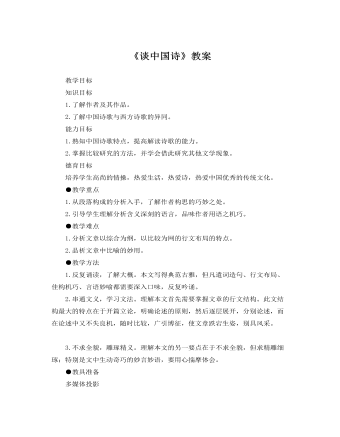
人教版高中语文必修5《谈中国诗》教案
教师提示:1.这句话的本体不是一般意义上的“中国诗”,即不是指中国诗歌中的某一类作品或某位诗人的作品,而是指中国诗的发展特点。早熟,是指“纯粹的抒情诗的精髓和峰极,在中国诗里出现得异常之早”;早衰,是指“中国诗一蹴而至崇高的境界,以后就缺乏变化,而且逐渐腐化”(腐化,是对诗的思想内容和艺术价值而言的)。这句话,借助比喻和比喻中的对比(“早熟”与“早衰”),从诗歌发展的角度,简要地说明了中国诗的艺术特征和由此产生的负面影响。2.这句话有两层意思:一是借梵文的《百喻经》阐释中国的艺术和思想体构上的缺欠,旨在批评;二是点明造成这种缺欠的根本原因。“一个印度愚人要住三层楼而不许匠人造底下两层”这样的建筑物就是“飘飘凌云的空中楼阁”,作者以此作喻,批评中国的艺术和思想体构缺乏严密的逻辑性,往往脱离客观实际,没有坚实的基础,其结果必定影响艺术的健康、稳定地发展。

人教版高中语文必修3《高老头》教案
4、问题讨论(1)巴尔扎克小说在法国文学史上的地位?在法国文学史的地位:随着巴尔扎克在法国文坛上的如日中天,他渐渐地被他的时代的作家所认识。戈蒂耶第一个站出来热情地赞扬巴尔扎克的天才。此后乔治·桑、波德莱尔、福楼拜、左拉对他赞誉有加。雨果甚至在巴尔扎克的葬礼上说:“在最伟大的人物中间,巴尔扎克属于头等的一个,在最优秀的人物中间,巴尔扎克是出类拔萃的一个。他的才智是惊人的,不同凡响的成就,不是眼下说的尽的……”人道主义斗士法朗士对文体非常苛求,他深请地说:“他是他那个时代的社会的洞察入微的历史家。他比任何人都善于使我们更好地了解从旧制度想新制度的过度。”特别强调:“从塑造形象和深度来说,没有人能比得上巴尔扎克。”后来的作家莫洛业说:“巴尔扎克不仅仅是十九世纪的优秀作家,他堪称最伟大的小说家,这在今天几乎是一致的看法。”
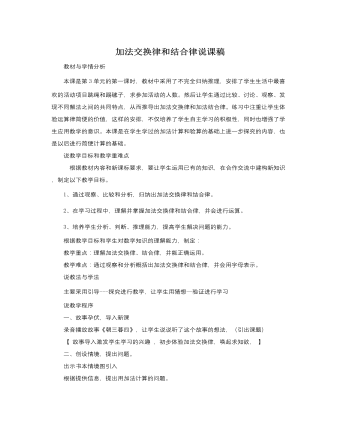
人教版新课标小学数学四年级下册加法交换律和结合律说课稿
3 比一比,谁算得快。38+76+24 (88+45)+124 、拓展560+(140+70)=(□ + □ )+ □ (64+□)+27=64+(□+27)71+68+ □ 你认为 □ 里填什么数会使你的计算简便?怎样简便计算?5、游戏:找朋友。(1) 哪两个同学手上的树叶的和是100?(2) 同桌一个同学说出一个数,另一个同学马上说出一个与它的和是整百、整千的数。【设计意图 :几个层次的练习,为学生提供了具有价值的学习内容,开放学生的思维空间,提高思维含量,学生在观察辨析中比较,在思考对比中升华,促进学生灵活地理解和掌握知识。】(五)、全课总结,引申知识今天这节课我们学习了什么知识?你是怎样获得这些知识的?那么在减法、乘法、除法中,有没有这样的规律呢?课后大家可以继续研究。【及时总结、巩固所学知识,重视学法总结。使学生在自己的整理总结中再次巩固了本节课的重难点。同时为学生以后的学习作好了铺垫】